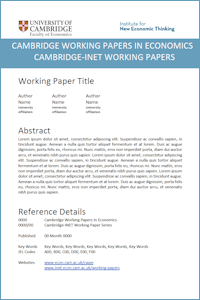
Ball, I. and Gao, X.
Checking Cheap Talk
WP Number: 1919
Abstract: We study a sender-receiver game. The sender observes the state and costlessly transmits a message to the receiver, who selects one component of the state to check and then chooses a binary action. The receiver's preferred action depends on the state. The sender has a state-independent preference for one action over the other. Nevertheless, communication can strictly benefit both players. We characterize the symmetric equilibria. In each one, the sender tells the receiver which components of the state are highest. The same equilibria exist in an extension where the receiver can check multiple components. We also find that with commitment power, the sender can extract more rents from the receiver by randomizing between signals that induce different actions. However, the receiver's ability to partially verify the state has an ambiguous effect on the sender's utility unless the sender has commitment power, in which case verification can only restrict the set of posteriors the sender can induce.
Keywords: cheap talk, partial verification, Bayesian persuasion
JEL Codes: D82 D83
Author links:
PDF: wp1919.pdf 
Open Access Link: 10.17863/CAM.43918
